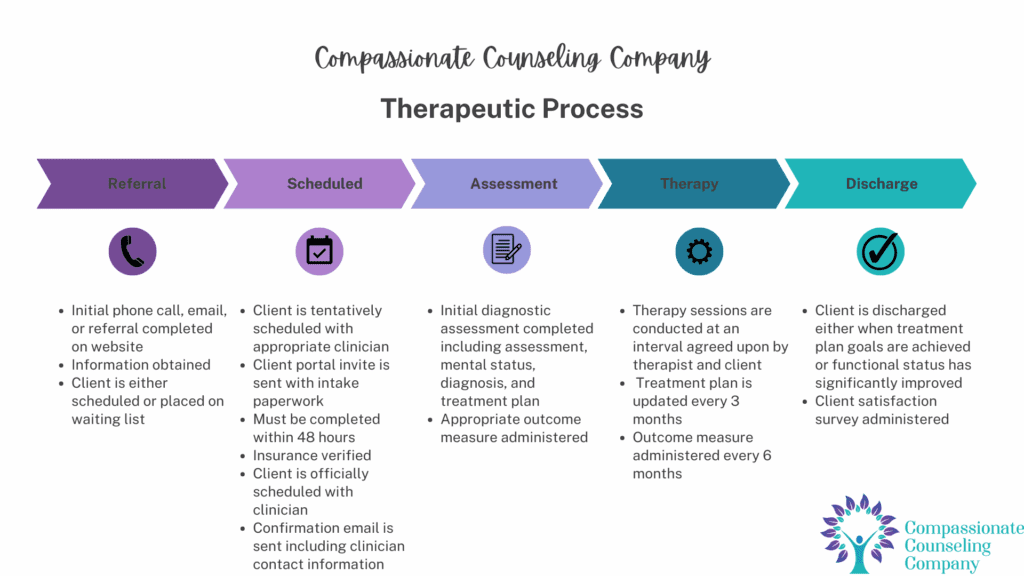If you have been considering going to therapy but have never attended a session before, you may be wondering what therapy looks like. This blog post is meant to help you understand the basics of what to expect from your sessions. Here is our therapeutic process at Compassionate Counseling Company:

Referral
Clients who are seeking mental health treatment for anxiety or stress, depression and mood changes, trauma, relationship and family issues, life transitions and grief, or substance misuse that are interested in working with one our therapists either complete a referral on our website, call our office at 774-218-5440, or email us at info@compassionatecounselingcompany.com. They speak to a member of our administrative team who confirms the information and the client is either sent our intake paperwork to complete via our online portal and scheduled with one of our clinicians or placed on our waiting list. Once their intake paperwork has been completed and their insurance has been verified they are sent a confirmation email with the details of their first session and the contact information for their clinician.
Intake
The first session of therapy you will attend will be the intake session and is about getting to know you. Therapy can be provided in person at virtually. Your therapist will ask questions about your history, current concerns, and what brought you to therapy. This is also a time for you to ask questions and get a sense of whether the therapist is a good fit for you. Your therapist will guide the conversation so it is okay if you are unsure what to say. This is an excellent time to ask your therapist any questions you have about the process including the modalities they use, how frequently you will meet, and how the sessions will be structured. They will also review their policies and how to ensure therapy is effective.
Ongoing Sessions
These are going to vary from therapist to therapist and even session to session. There may be sessions where you may be more focused on what is happening in your life currently and there may be sessions that are focused more on your past experiences. There will likely be a treatment plan that you co-create including goals, objectives, and interventions to help guide the process. These goals might be specific (like improving sleep or managing anxiety) or broader (like gaining insight or improving relationships). Therapy is a collaborative process — your input is always important.
In ongoing sessions, you will explore your thoughts, emotions, behaviors, and experiences. Your therapist may help you make connections, offer coping tools, and support you in processing difficult situations or feelings. Sessions may feel emotional at times, but they are meant to be a safe, nonjudgmental space for you to grow. Therapy is not one-size-fits-all. As you grow and change, the focus of your sessions might shift. Your therapist will check in with you regularly about what’s working and adjust the approach as needed. Your therapist will likely review your treatment plan and regular intervals and administer outcome measures which are standardized tools and assessments used to evaluate your mental health and well-being as a result of therapy.
You also will get the chance to tell your therapist if something is working or not. One of the most important parts of therapy is the relationship you build with your therapist. Trust, consistency, and open communication are key. If something isn’t working or you have concerns, your therapist will want to hear that — feedback helps make therapy more effective. A good therapist will be able to take that feedback and try to tailor their sessions to work better for you or will be able to help you find a therapist who can work with your needs so do not be afraid to give feedback!
Discharge
Whether it’s after a few months or a few years, ending therapy (often called “termination”) is a meaningful part of the process. You’ll review your progress, talk about next steps, and make a plan for the future. Some people return to therapy later in life, and that’s totally okay.
Contact Us
If you are located in Massachusetts or Rhode Island, we would be honored to assist you on your healing journey. The care coordinators on our administrative team are here to help you get started and answer any questions you have so do not hesitate to reach out today.



